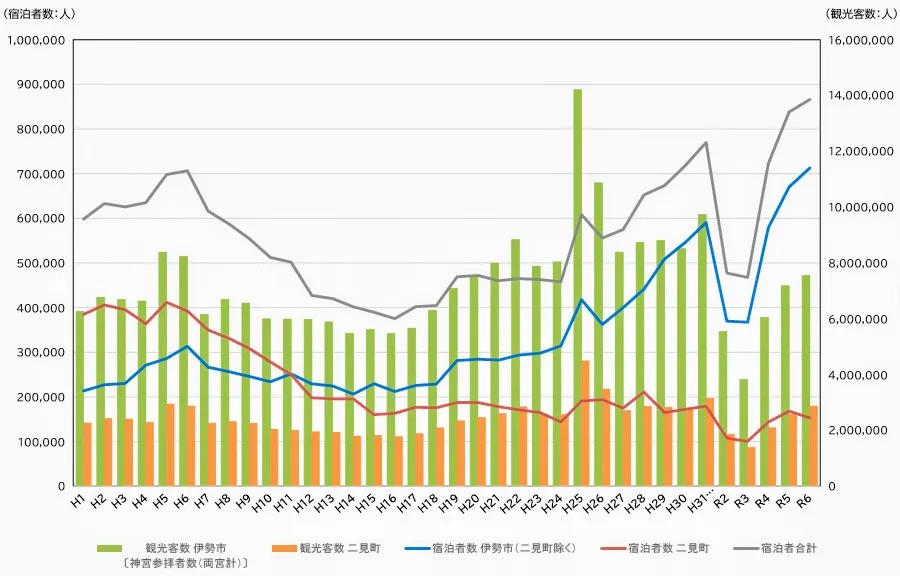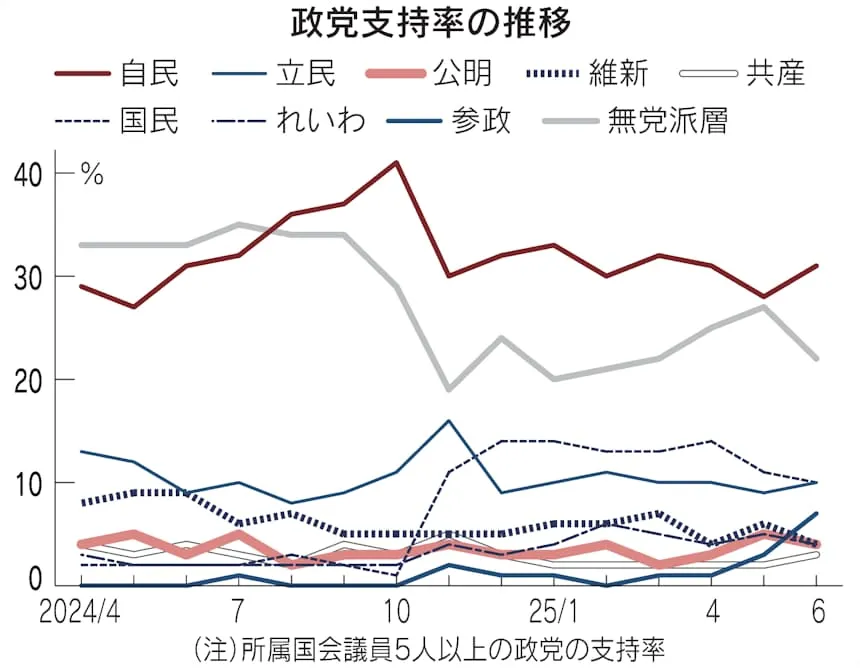【デジタル観光統計オープンデータから5月の三重県の観光目的入込数】The number of visitors to Mie Prefecture for tourism purposes in May from the digital tourism statistics open data
【三重県2024】Mie Prefecture 2024
三重県の「観光レクリエーション入込客数推計書」は例年6月には公表されるが、今年はまだ出ていない。そこで今回は「三重県観光統計データ」から2024年の速報値を記録する。これによると、三重県の日本人延べ宿泊数は8,452,540人/年で、外国人延べ宿泊者数は239,630人/年となっている。
Mie Prefecture's "Tourism and Recreation Visitor Estimates" are usually released in June, but this year they have not yet been released. Therefore, I record here preliminary figures for 2024 from "Mie Prefecture tourism statistics data". According to this, Total number of Japanese overnight guests in Mie Prefecture is 8,452,540 person/year, and Total number of foreign overnight guests was 239,630 person/year.
Incidetally, according to the Ise City Tourism Statistics 2024, the number of tourists and overnight guests in Ise and Futami over the past 36 years is as follows. The sharp increase in 2013 is due to the 62nd Shikinen Sengu Ceremony, and the declines in 2020 and 2021 are due to the Wuhan virus pandemic.
【2025年5月の国際収支】Balance of Payments for May 2025
航空旅客は47億円の赤字、海上旅客も30億円の赤字、そして、その他サービスも3755億円の赤字だ。とはいえ、サービス収支全体では2011億円の黒字となった。辛うじてではあるが。
On July 8, the Ministry of Finance announced the balance of payments for May. The current account balance was a surplus of 3.4364 trillion JPY. The trade balance was a deficit 522.3 billion JPY. The travel balance was a surplus of 629.2 billion JPY. But, Mie Prefecture's contribution is extremely small.
Air passenger was a deficit 4.7 billion JPY, Sea passenger was a deficit 3 billion JPY. and, Other services was deficit 375.5 billion JPY. however, The overall service balance was a surplus 201.1 billion JPY. although it is only a small amount.
【日本人ファースト】The Japanese First
多くの日本人が、国政が「日本人ファースト」ではないと感じている中、一つの新興政党がこの考え方を明確に打ち出し注目を集めている。この米国大統領に倣う自国第一主義は、これまでの政党が明確に打ち出せなかった理念であり、支持率上昇の背景にあると分析されている。
問題とされるのは疑似移民政策である。日本における少子化問題は既に30年以上前から認識されていたが、具体的な「産めよ増やせよ」政策が講じられることはなかった。国政選挙の得票には繋がらず、また、定期的な異動がある行政職員も政治の後楯がない以上、将来的なビジョンを持って業務に取り組むことがなかったからだ。それ故、労働生産人口減少の代替措置としての色合いが強い今の曖昧な移民政策は、安価な労働力を求める産業界に主導されており、将来的に大きな問題を引き起こす可能性をはらんでいる。これは外国の先発事例をみても明らかであり、例えばスウェーデンでは、かつて寛容な移民・難民政策をとっていたものの、福祉目当ての外国人流入が増加して犯罪率が急増、この経験から難民政策を180度転換、受け入れを拒否するに至っている。
ひるがえって、今の日本においても、留学生への過剰な補助や、国内の状況を顧みずに外国政府に便宜を図る政策に懐疑的な声が増え、医療保険の不正利用、国際免許の安易な取得と、それに伴うブローカーの暗躍が問題視されてきている(緩い国内制度を容認したり、積極的に作り出す政治家がいる。外国勢力からのキックバックすら疑われるとの厳しいご意見も頂戴した)。
これらの事を通じ、「日本人ファースト」という理念の重要性が強調されるとともに、現在の日本の移民・外国人政策、およびそれに関連する制度の不備に対する強い懸念と批判に対し、日本の将来を見据えた政策転換の必要性が求められている。でなければ、親日的な訪日外国人観光客による外貨獲得さえ覚束なくなる可能性がある。そうなれば、モノ貿易の収支が恒常的に赤字となっている日本の外貨獲得産業はオール赤字にさえなりかねないのだ。因みに、「日本人ファースト」は外国人排斥ではなく、日本に来るなら日本のルールを守るべきだという当たり前の主張であって、排他主義ではない。
ところで、「日本人ファースト」だけでは、日本衰退の根本原因である労働生産人口減少による国力低下を食い止めることはできない。必要なのは既婚者の出産を支援する事ではなく、(何度も書いてきたが)ロシアの「母親資本制度」のように、投資として国が出産そのものを奨励する政策である。残念ながら、ここまで踏み込んだ政党は今のところはない。
The problem is the pseudo-immigration policy. Japan's declining birthrate problem has been recognized for more than 30 years, but no concrete "have more children" policies have been implemented. This is because it did not lead to votes in national elections, and administrative officials, who are regularly transferred, have no vision for the future as they do not have the backing of politics. Therefore, the current pseudo-immigration policy, which is strongly colored as an alternative measure to the decline in the productive labor force, is led by the industrial sector seeking cheap labor, and has the potential to cause major problems in the future. This is clear from previous examples in other countries. For example, Sweden once had a tolerant immigration and refugee policy, but the influx of foreigners seeking welfare increased, causing a sharp rise in the crime rate, and this experience led to a 180-degree change in refugee policy and refusing to accept them.
In contrast, even in today's Japan, there is growing skepticism about excessive subsidies for international students and policies that favor foreign governments without considering the domestic situation, and the fraudulent use of medical insurance, the easy acquisition of international licenses, and the associated activities of brokers are becoming problems (there are politicians who tolerate or actively create lax domestic systems. I have also received harsh criticism that there are even suspicions of kickbacks from foreign forces).
Through these things, the importance of the idea of "Japanese First" is emphasized, and in response to strong concerns and criticism about the shortcomings of Japan's current immigration and foreigner policies and related systems, there is a need for a policy change with an eye to Japan's future. Otherwise, there is a concern that it may become difficult to even earn foreign currency from pro-Japanese foreign tourists visiting Japan. If that were to happen, Japan's foreign currency earning industries, whose goods trade balance is perennially in a deficit, would suffer the consequences of total annihilation. Incidentally, "Japanese First" is not about excluding foreigners, but is a common assertion that if you come to Japan, you should follow Japan's rules, and is not exclusivism.
By the way, "Japanese First" alone cannot halt the decline of Japan's national power due to the decline in the productive labor force, which is the root cause of Japan's decline. What is needed is not to support married people having children, but a policy in which the government encourages childbirth itself as an investment, like Russia's "Система материнского капитала". Unfortunately, no political party has mentioned this so far.
【雨の伊勢神宮外宮】Ise Jingu Shrine Geku on a rainy day
Copyright (C) 2015 O.H.M.S.S. All rights reserved
******************************************************************************
O.H.M.S.S.(Ohuda Higashi-kishu Matsusaka-area Sightseeing Support)
Representative Shigeki Imura
a support member of UN Tourism / APTEC
Home https://ohmss700.blogspot.com/
Index https://ohmss700.livedoor.blog/archives/57229908.html




















